Planet Earth Blu-ray Movie
HomePlanet Earth Blu-ray Movie 
US Discovery Channel Edition2006 | 480 min | Rated TV-G | Jul 31, 2007
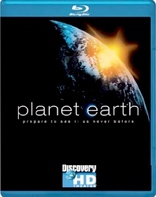
Movie rating
8.9 | / 10 |
Blu-ray rating
| Users | 5.0 | |
| Reviewer | 3.0 | |
| Overall | 3.4 |
Overview
Planet Earth (2006)
This Discovery Channel version is narrated by SIGOURNEY WEAVER.<br>With an unprecedented production budget of $25 million, and from the makers of Blue Planet: Seas of Life, comes the epic story of life on Earth. Five years in production, over 2,000 days in the field, using 40 cameramen filming across 200 locations, shot entirely in high definition, this is the ultimate portrait of our planet. A stunning television experience that captures rare action, impossible locations and intimate moments with our planet's best-loved, wildest and most elusive creatures. From the highest mountains to the deepest rivers, this blockbuster series takes you on an unforgettable journey through the daily struggle for survival in Earth's most extreme habitats. Planet Earth takes you to places you have never seen before, to experience sights and sounds you may never experience anywhere else.
Narrator: David Attenborough, Nikolay Drozdov, Thomas Anguti JohnstonDirector: Alastair Fothergill, Mark Linfield
| Documentary | Uncertain |
| Nature | Uncertain |
Specifications
Video
Video codec: MPEG-4 AVC
Video resolution: 1080i
Aspect ratio: 1.78:1
Original aspect ratio: 1.78:1
Audio
English: Dolby Digital 5.1
English: Dolby Digital 2.0
Subtitles
English
Discs
25GB Blu-ray Disc
Four-disc set (4 BDs)
Playback
Region A (B, C untested)
Review
Rating summary
| Movie | 4.0 | |
| Video | 3.5 | |
| Audio | 3.0 | |
| Extras | 1.5 | |
| Overall | 3.0 |
Planet Earth Blu-ray Movie Review
Be sure to purchase the BBC Video release instead...
Reviewed by Kenneth Brown May 1, 2009Filmed entirely in high definition, shot in jaw-dropping locales over the course of several years, and tossing out some of the most gorgeous, astonishing sequences you'll ever see as if they were nothing more than Tootsie Roll candies at a parade, Planet Earth isn't just another documentary series, it's a force of cinematic nature that, in this humble reviewer's opinion, has no equal. However, shortly after plowing through its exceptional BBC Video release, I found myself wondering if the US edition (produced and distributed directly by Discovery HD) was much different from the British version. The answer, unfortunately, is yes... quite different. Not only does Sigourney Weaver step in for narrator David Attenborough, five to seven minutes of footage has been trimmed from each episode (dropping the series' total runtime by nearly seventy minutes), the opening sequence has been changed, and the technical video presentation takes a slight hit in quality. While the series itself is still quite powerful in the grand scheme of things, anyone seriously considering Planet Earth should stick to the BBC Video version.
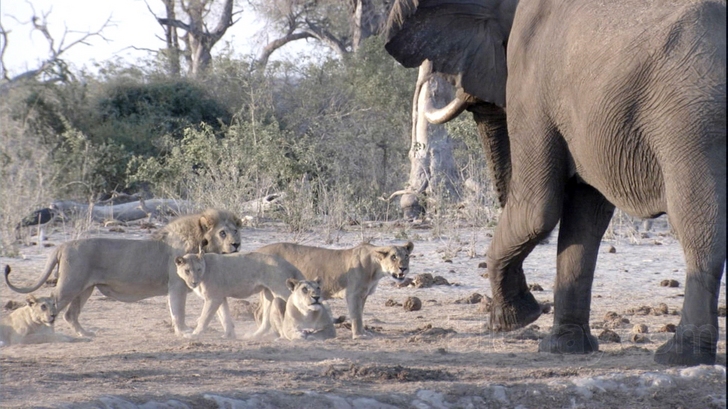
Please note: the specific screenshots in this review were taken in an attempt to highlight the seemingly minor differences between the Discovery HD and BBC Video transfers.
With that bit of bad news out of the way, allow me to move on to the series proper. Planet Earth doesn't waste any time establishing its purpose and intent with its first episode, From Pole to Pole, an at-times unnerving introduction to our world's changing climate, diverse wildlife, and shifting landscapes. First acquainting viewers with Antarctica and its penguins, the BBC cameras move on to Canada, Russia, and Africa, stopping to watch predators capture prey, herds adapt to their harsh surroundings, and migration patterns emerge. Mountains explores the breathtaking mountain formations scattered across the globe using stunning aerial photography, even taking time to examine the co-dependent behavior of several species, the birth of new life, and endangered animals struggling to survive. Fresh Water rushes alongside the rivers and inland streams of the world, all while investigating the many creatures who depend on three percent of the planet's water supply to thrive. Salmon, grizzlies, river dolphins, salamanders, piranha, and birds of all shapes and sizes are investigated at length as Weaver dryly dissects the careful equilibrium each species strikes within its natural habitat.
It only gets more interesting from there. Caves drops below the planet's surface, plummeting down endless chasms, focusing on beasts who live their lives in darkness, and revealing the extents to which species will adapt to their surroundings. Deserts travels to Mongolia, Egypt, Australia, and more in search of life and death in the hottest, driest places on Earth. At the opposite end of the spectrum is Ice Worlds, an intriguing episode that digs into Antarctica, the Arctic, and the unique geological and ecological conditions of each pole region. Great Plains turns the series' attention to the world's grasslands and their abundant animal kingdoms. Jungles plunges into rainforests and, you guessed it, jungles to uncover the strange and otherworldly creatures that inhabit the trees, brush, and waters of the overgrown terrain. As the series begins to draw to a close, Shallow Seas turns its focus to the aquatic mammals of the deep, numerous aquatic species, and a bizarre lineup of coral, sharks, and squid. Seasonal Forests finds the PE crew examining the tallest trees in the world, broad-leafed forests, more astonishing wildlife, and the changes brought on by the passing seasons. Finally, Ocean Deep drops below the deepest waters of the planet to a place so foreign that its strange creatures become the stuff of nightmares.
At every shot, stop, and subject, Planet Earth delivers some of the most mind- blowing, heart-stopping, assumption-erasing visuals I've ever had the pleasure to watch. It's not all soft and cuddly either -- death lurks around every corner, animals are shown as they are (not as we want them to be), and genuine sadness is evoked on more than one occasion. At the same time, the series captures a sense of unbridled wonder and limitless awe and the scope and sheer enormity of our planet. I've never felt so privileged to feel so small and insignificant; I've never felt so overwhelmed by a collection of fleeting images. Perhaps its the under-nurtured nature nut in me, but I couldn't help but soak up every frame, every scene, and every sequence as if it were the last I would see.
I may be out of adjectives, but I always find myself recommending Planet Earth to
anyone who will take the time to settle in for the long haul. While it can be a bit much for
younger children, it's an excellent series for families, classrooms, and private viewings; one of
those rare productions that can be literally enjoyed on some level by everyone. Its eleven
episodes require a healthy investment of time, but I think anyone who makes the investment
will be more than happy with the results. Just be sure to nab the BBC Video version to get the
most bang for your high definition buck.
Planet Earth Blu-ray Movie, Video Quality 
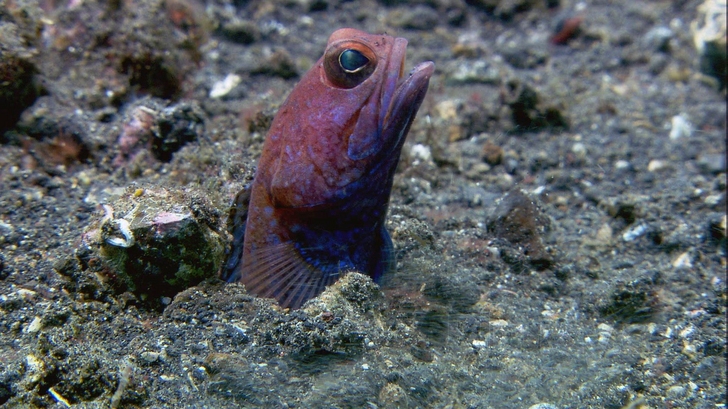
Unlike the 1080p BBC Video version, the domestic Discovery HD release of Planet Earth presents each episode with a somewhat inferior 1080i/AVC-encoded transfer. It competently renders every wisp of dust, splinter of ice, and patch of fur, but its overall polish and proficiency is a bit lacking. Detail is sharp as well… just not as refined as its British counterpart. Even so, edges are well-defined, shadow visibility is notable, and texture clarity is reliable. Moreover, colors remain vivid and inviting, saturation is still spot on, shadows are deep and convincing, and solid contrast leads to enviable depth and dimensionality. Sadly, the picture is haunted by a variety of technical mishaps that rarely affect the BBC edition. Artifacting and wavering appear in the darkest scenes, mild noise clutters a few high-contrast shots, and banding is more prevalent in undersea sequences. The full-length release of Planet Earth remains one of the go-to releases I pop in when I want to impress my friends and family with the impact of high definition. It looks fantastic from beginning to end, outperforms the standard DVD version in every way, and continues to lead the pack when it comes to documentaries available on the market. Alas, this comparatively disappointing American release is little more than an imposter.
Planet Earth Blu-ray Movie, Audio Quality 
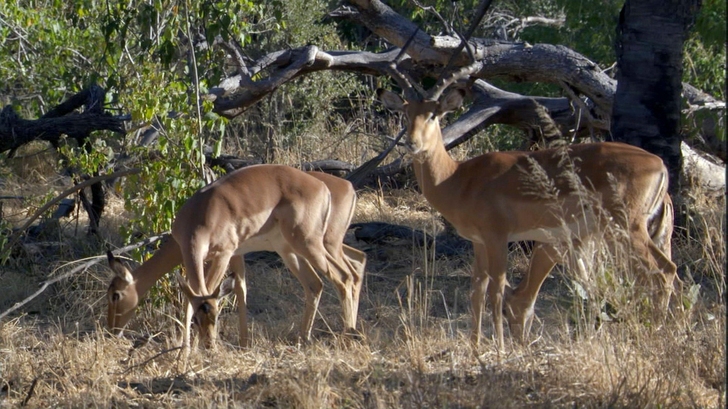
Regardless of the version you choose, Planet Earth's only major weakness is its limited Dolby Digital 5.1 surround track. Weaver's narration comes through as clear as anyone could hope for, but the episodes simply don't have the sort of aural allure I wanted to hear paired with the stunning photography. Ambience is middling in all but the most bombastic sequences, LFE thooms rarely resonate with show-stopping power, and volume leveling could use some work. Yes, most of the soundscape elements are passable -- most are even likely to subtly draw you into the series as a whole -- but I couldn't shake the feeling that it could all sound much better. Ultimately, I have to shrug my shoulders and admit that a narrated documentary series of this nature rises and falls with its video transfer... not its audio track. While the audiophile in me still wishes my ears were as overwhelmed as my eyes, documentary fans and Planet Earth regulars will be pleased with what they hear.
Planet Earth Blu-ray Movie, Special Features and Extras 
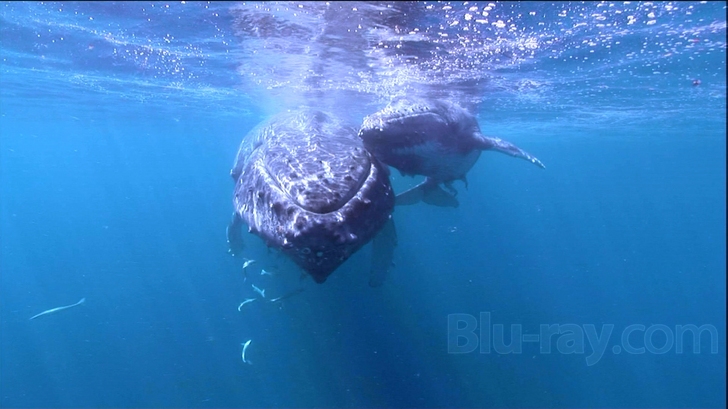
The only area in which the domestic Discovery HD edition bests the BBC Video release is in terms of supplemental content. While the 4-disc British version doesn't include any special features, the US release offers a brief-but-interesting quartet of solid behind-the-scenes featurettes (40 minutes). Granted, it doesn't amount to much, but it's certainly better than nothing.
Planet Earth Blu-ray Movie, Overall Score and Recommendation 

Suffice to say, the US Edition of Planet Earth isn't worth any consideration so long as the BBC Video version is alive and kicking. The domestic release lops seventy minutes off the total series runtime, inexplicably changes narrators, and comes up comparatively short in terms of video quality. While it does tack on a few blink-and-you'll-miss-em featurettes, it simply can't measure up to its big British brother. Be sure to pick up the BBC Video version if you have any intention of bringing Planet Earth home.
Other editions
Planet Earth: Other Seasons

Planet Earth
The Complete Series
2006

Planet Earth
The Complete Series | Special Edition
2006

Planet Earth
The Complete Series | Limited Edition
2006
Similar titles
Similar titles you might also like

Life
BBC / Narrated by David Attenborough
2009

Planet Earth II 4K
2016

Human Planet: The Complete Series
BBC
2011

Galápagos
2006

Earth: The Biography
2007

Ganges
2007

Frozen Planet
The Original UK Series
2011

Nature's Most Amazing Events
2009

Wild Pacific
2008

Wild China
2008

HOME
2009

Earth: One Amazing Day 4K
2017

Grand Canyon Adventure: River at Risk 3D
IMAX 3D
2008

Blue Planet II 4K
2017

Wonders of the Solar System
2010

Blue Planet
Double Feature with The Dream is Alive
1990

Under the Sea
IMAX
2009

Earth
Disneynature
2007

Seven Worlds, One Planet 4K
2019

The Universe: The Complete Season Seven
Ancient Mysteries Solved
2013